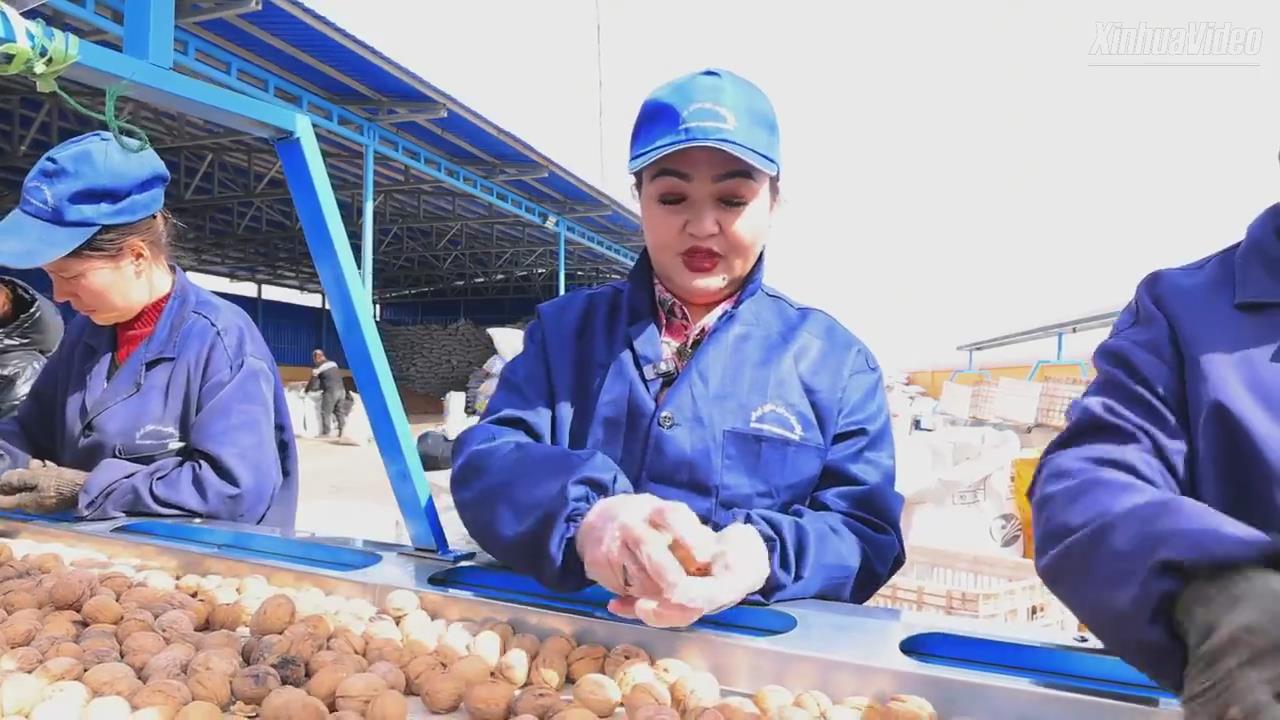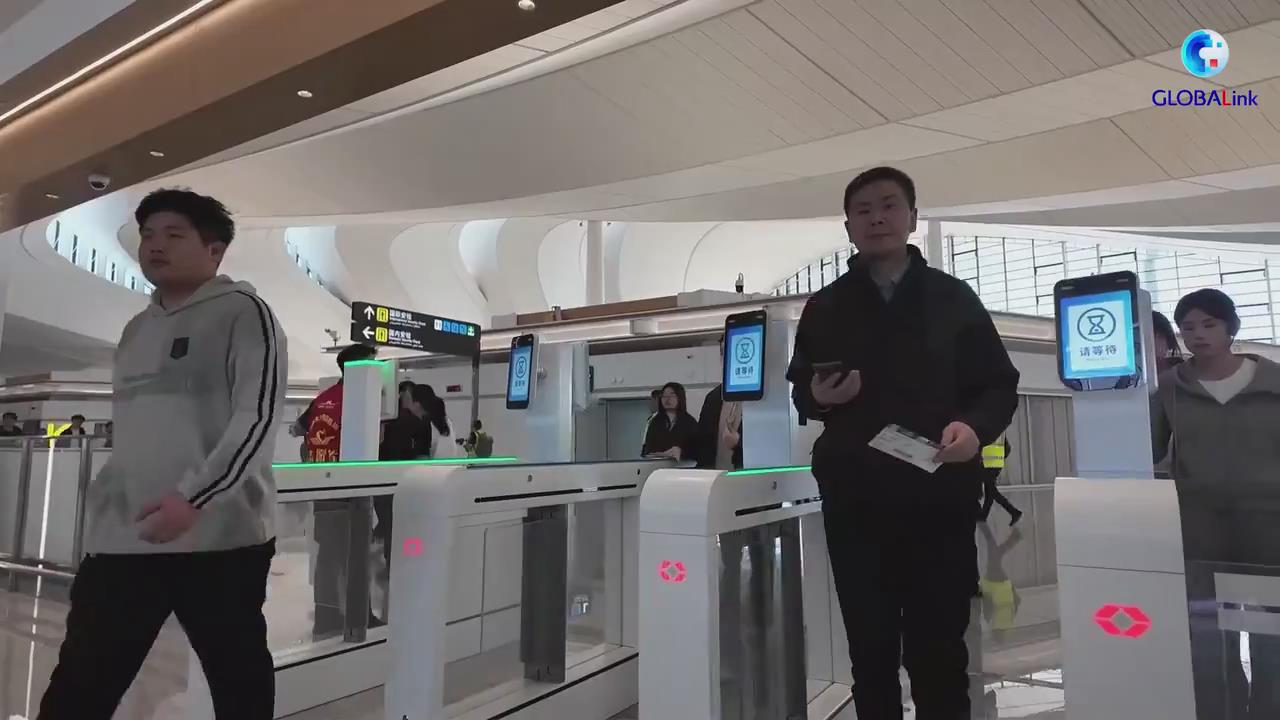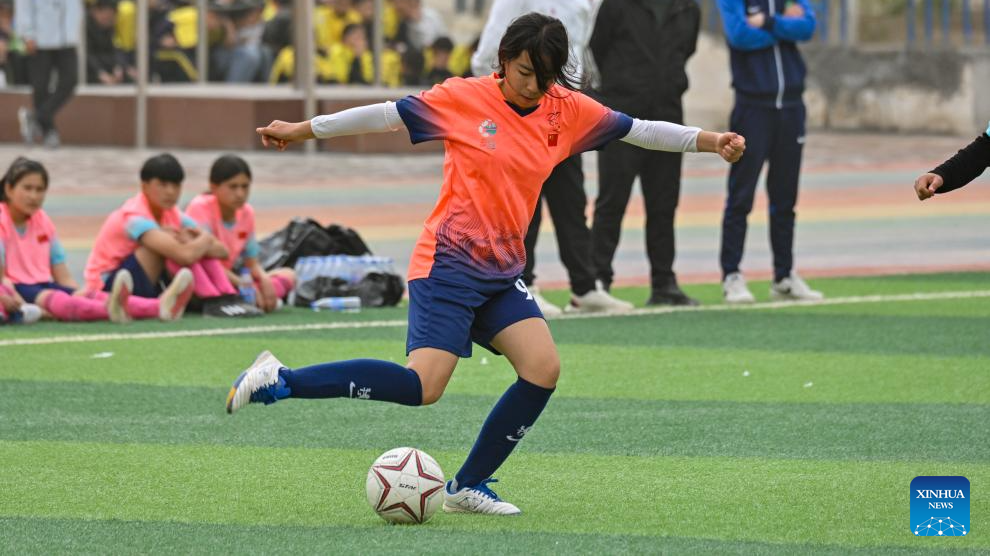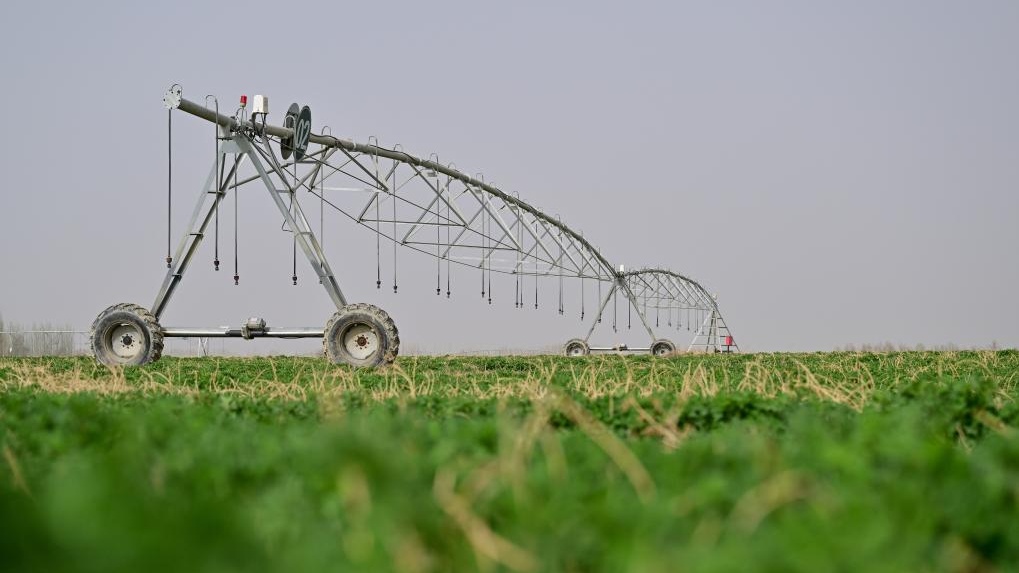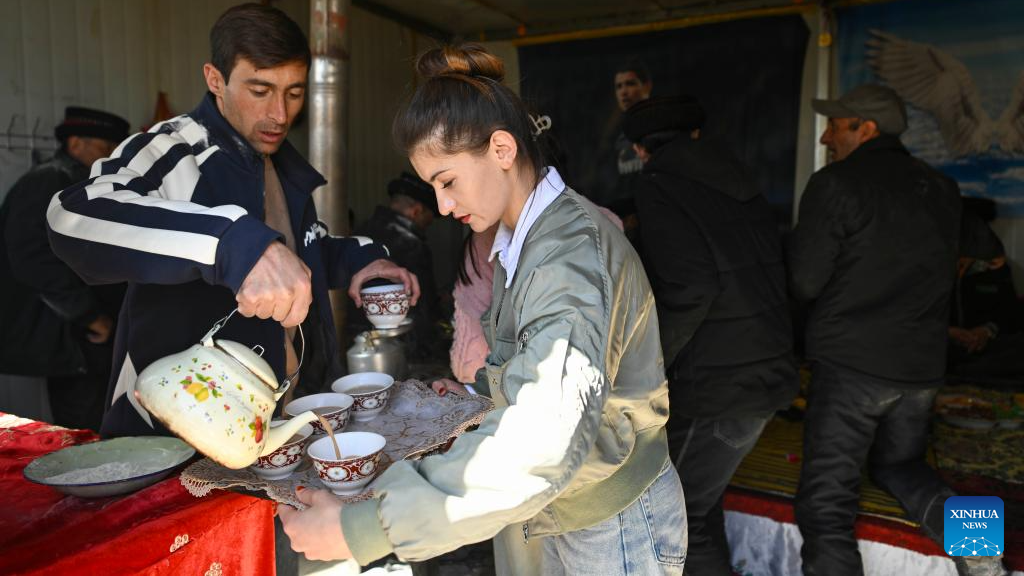
Photo taken on July 20, 2021 shows the Special Press Conference on Corban Festival in Urumqi, capital of northwest China’s Xinjiang Uygur Autonomous Region. Photo by Xinjiang Daily/ Zou Yi
On July 20th, 2021, the Xinjiang Uygur Autonomous Region held a special press conference on Corban Festival (Eid al-Adha) in Xinjiang. Five representatives of ethnic groups from Urumqi, Turpan, Aksu, Kashgar and other places were invited to talk about their work and life. And through the video link we are able to learn about how the people in Aksu, Hotan are celebrating the Corban Festival.
Elijan Anayat: Greetings, journalists and friends from the media! Welcome to Xinjiang Uygur Autonomous Region press conference. I’m Elijan Anayat, spokesman of People’s Government of Xinjiang Uygur Autonomous Region.

Photo taken on July 20, 2021 shows Elijan Anayat, spokesman of People’s Government of Xinjiang Uygur Autonomous Region answers questions at the Special Press Conference on Corban Festival in Urumqi, capital of northwest China’s Xinjiang Uygur Autonomous Region. Photo by Xinjiang Daily/ Zou Yi
Today, it is Corban Festival (Eid al-Adha), I wish you all a happy holiday. In Xinjiang, people of all ethnic groups in the region are enjoying a three-day holiday during the Corban Festival (Eid al-Adha). In order to celebrate the arrival of the festival, people of all ethnic groups start to prepare for the Corban Festival (Eid al-Adha) half a month ago, cleaning their houses and yards, preparing special food, purchasing festival items, such as new clothes for their families. The government also guarantees the daily supplies of people of all ethnic groups during the festival from many aspects. The supermarkets and the markets have prepared enough supplies already, dried fruit, pastries, jams, meat, etc., rich in varieties. The supply is guaranteed. On the day of the festival, people of all ethnic groups send New Year greetings to each other, getting together, eating delicious food, watching the wonderful Corban Festival (Eid al-Adha) gala. Everywhere is brimmed with the festival's happiness and peace.
Today, we invite the follows, Yakupjan Yalkun, owner of a barbecue restaurant in Kashgar City. Abduxukur Rehmutula, Imam of the White Mosque in Urumqi, Ablikim Arken, farmer from Toksun County of Turpan City, Yasenjan Elik, resident of Aksu City, Mikray Yibrayim, deputy director of Xinjiang Art Theatre Creative Research Office, National First-class Director. Now, let’s welcome them to talk about the story about themselves and Corban Festival (Eid al-Adha).
To celebrate Corban Festival (Eid al-Adha) in 2021, the family of Yakupjan Yalkun in Kashgar could not resist the excitement of the festival and made early preparations for Corban Festival (Eid al-Adha). Let's take a look at their preparations for the festival via a video clip.
Elijan Anayat: Now let’s invite Yakupjan Yalkun to tell us how his family celebrate Corban Festival (Eid al-Adha).

Photo taken on July 20, 2021 shows Yakupjan Yalkun speaks at the Special Press Conference on Corban Festival in Urumqi, capital of northwest China’s Xinjiang Uygur Autonomous Region. Photo by Xinjiang Daily/ Zou Yi
Yakupjan Yalkun: Hello. My name is Yakupjan Yalkun, and I run a barbecue restaurant in Kashgar City. Today is Corban Festival (Eid al-Adha), wish you all a happy holiday! I'm glad to be here to share our holiday with you.
Today in Kashgar, the festival atmosphere is particularly joyful. We all slaughter sheep, wear new clothes, visit our relatives, and the old give lucky money to the children. The children are very happy.
Near the Corban Festival (Eid al-Adha), families are busy already, the women are busy cleaning, tidying up the house to greet the arrival of the festival. We also make various kinds of exquisite snacks, such as Sangza, fried dough twists, deep-fried dough cake, Bahali cake, etc., to prepare enough delicacies for relatives and friends who come to visit us during the festival. And the men are busy making preparations outside. Our family is no exception, every year on a holiday, I would buy holiday gifts to my parents, wife, children and buy new clothes for them, we are all dressed beautifully. Finally, the most important thing for my son and I to do is to go to the bazaar to select the fattest sheep.
The afternoon before the festival, I took my wife and children to my parents' home to help them with housework and festival preparations. After dinner, we went back to our own home.
Before sunrise on the day of Corban Festival (Eid al-Adha), we bathe and change clothes, visit the graves and pay respects to our dead relatives. After that, Muslims come to the mosques to attend the Congregational Prayer. After the ceremony, the musicians would go up to the gate of the mosque and play the naqqara and suona. The people of all ethnic groups would dance the passionate Sama dance together to celebrate the arrival of the festival. I took my son with me to watch Sama dance. It was a huge crowd. It is very lively. When seeing everyone dancing happily, my son and I would record it on Tik Tok.
When Sama dance is over, it's time to go home and slaughter the sheep. After the mutton is packed, I would keep part of the mutton for my family own use and give the rest to my neighbors. After the sheep is killed, I would take my wife and children to my parents' home to pay New Year greetings. My parents' home is very lively. My two younger brothers and their wives and children are all there. We are laughing and greeting each other, sending lucky money to the children. The table is full of all kinds of food, we eat anything we want. The cooked mutton is served on the big plate. we eat to our heart’s content. This feeling is so great.
At noon, my whole family would visit my father-in-law's home and send greetings to my wife's brothers and sisters. We would send lucky money to my nephews and nieces. We would have mutton and mutton soup, and I like eating Zhuafan(Pilaf) and Huntun made by my mother-in-law very much. After dinner, we sat around watching TV and chatting, talking about family trifles. At dinner, our family reunion to have a meal and invite each other to their own homes to pay New Year greetings.
When we get home in the evening, the most happy thing for children is to count the lucky money they have received. Seeing the children's expressions when they count lucky money, I asked: "Kids, are you thinking about how to spend this lucky money?" My son replied quickly, "Yes! I want to buy my favorite toy racing car." My daughter said, "I want to save my lucky money and give mother a gift on her birthday." I smiled at what the children were saying. Thinking of how I used to run out with my lucky money to buy a Popsicle when I was a kid. It seems like just yesterday. Now the life is getting better and better, the life has become more affluent.
The annual Corban Festival (Eid al-Adha) gala is a must. The family would sit in front of the TV, watching the gala attentively. It’s a particularly happy time. Every year the Corban Festival (Eid al-Adha) gala is especially wonderful, there are singing and dancing performances, skits and other programs, I can't help dancing with the music, not to mention the joy and excitement of the children. That is my day on Corban Festival (Eid al-Adha).
For me, Corban Festival (Eid al-Adha) is a day to stop thinking about work and spend time with my wife and kids. It's just a day to have fun with friends and family. It’s a warm festival visiting both parents, friends and relatives to strengthen family tie and friendship.
Elijan Anayat: Thanks Yakupjan Yalkun for telling us. On the day of Corban Festival (Eid al-Adha), people of different ethnic groups celebrate the festival in different ways, and Muslims attend the ceremony in the mosque. Abduxukur Rehmutula, Imam of the White Mosque in Urumqi, presided over the Corban Festival (Eid al-Adha) ceremony in the mosque this morning. Next, we would invite Abduxukur Rehmutula to tell his story.

Photo taken on July 20, 2021 shows Abduxukur Rehmutula speaks at the Special Press Conference on Corban Festival in Urumqi, capital of northwest China’s Xinjiang Uygur Autonomous Region. Photo by Xinjiang Daily/ Zou Yi
Abduxukur Rehmutula: My name is Abduxukur Rehmutula, I’m 53 years old. I’m a Uygur from Urumqi in Xinjiang. Today is Corban Festival (Eid al-Adha), I wish you all a happy holiday!
Abduxukur Rehmutula: I grew up in Urumqi, I studied in Urumqi from primary school to junior high school and went to senior high school in Turpan. From 1988 to 1993, I studied at College of Xinjiang Islamic Classics. I have witnessed the development of Urumqi and the prosperity of Xinjiang.
After I graduated from College of Xinjiang Islamic Classics, I began to work as a religious staff in August 1993. In 2007, I became an Imam at the White Mosque. Since taking up the position of religious staff, I have been to the Minzu University of China for further study and to College of Xinjiang Islamic Classics for exchange and study. The Party and the government have given religious people the opportunity to participate in the deliberation and administration of state affairs. I was honored to be elected vice chairman of China Islamic Association, vice chairman of the Islamic Association of the Autonomous Region, and vice chairman of the Urumqi CPPCC.
In recent years, great changes have taken place in the quality of life, environment and income of Urumqi residents. With the favorable policies of the state, I opened a snack bar in 1993, partnered with my friends to cook while learning, and later operated independently, from a small shop less than 30 square meters to a catering enterprise with chain stores all over the region step by step. In November 2010, I invested 5 million yuan to register and set up Xinjiang Aibike Investment Co., Ltd. Up to now, 28 chain restaurants have been set up, and the other two would open soon. Now, the company's annual income is about 3 million yuan, which makes me very happy.
The employees of our company often go to other provinces (cities) to attend training and learn advanced catering production and management techniques. The development of our company cannot be achieved without the support and help of friends of all ethnic groups. I have many good friends of different ethnic groups, we would send blessings and gifts to each other on festivals and invite others to be guests at home. In 2006, I met a friend named Wu Peixiu who supplied goods to our company. If we have no money to pay him, I would get him an IOU. When we have money, we can pay it back immediately. Our friendship has lasted until now for 15 years. The decoration designer I met in 2009 is Liu Chunhui, who comes from Shanghai. Every time he comes from Shanghai to Xinjiang to help us with design. We are like relatives. We would take the initiative to help each other when we need help.
Over the years, my family and I have enjoyed various policies that benefit the people, such as medical care, old-age care and favorable policies for start-ups. Now our life is getting better and better. We should cherish the good life we have now, resolutely safeguard the national unity and ethnic unity, and maintain social stability and lasting peace and order in Xinjiang.
On the beautiful land of Xinjiang, every citizen has the freedom to believe in or not to believe in any religion. Religious believers and non-believers respect each other and live in harmony. Religious places are open to the public, religious believers are free to worship, and religious activities are carried out normally. In order to provide religious believers with a comfortable place for religious activities, the government has invested a large amount of money to equip religious places in the city with television sets, water dispensers, air conditioners, shoe cover devices and other equipment to improve the environment of religious places.
I read on the Internet that Western anti-China forces are spreading rumors about "restrictions on religious freedom" in Xinjiang. They just want to disrupt our beautiful life and destroy the stability of our Xinjiang. I can tell them from my own experience that there is no such thing as "restriction of religious freedom" in Xinjiang, and that it is wishful thinking if they mean to ruin our beautiful life.
Elijan Anayat: Thanks Abduxukur Rehmutula. Corban Festival (Eid al-Adha) is also a time for reunion. On this day, people who leave their hometown to work and study would come back home and enjoy delicious food and talk with family members. Then love among family members wipes out the exhaustion of the journey. Now let's invite Ablikim Arken, from Chang 'an Village of Bostan Town of Toksun County in Turpan, to tell us his story.

Photo taken on July 20, 2021 shows Ablikim Arken speaks at the Special Press Conference on Corban Festival in Urumqi, capital of northwest China’s Xinjiang Uygur Autonomous Region. Photo by Xinjiang Daily/ Zou Yi
Ablikim Arken: Hello, my name is Ablikim Arken. I’m 42 years old this year. I’m from Chang 'an Village of Bostan Town of Toksun County in Turpan City. I born and grown here since my childhood, I have witnessed the changes and development here. Today is Corban Festival (Eid al-Adha). Happy Corban Festival (Eid al-Adha). First of all, I would like to ask you to look at my present happy life through a video.
Ablikim Arken: Today, adults, children would put on their most beautiful new clothes, greet each other in this New Year and send blessings. As the living conditions are getting better and better, the forms of festivals are becoming more and more diversified. We usually start preparing for the Corban Festival (Eid al-Adha) half a month in advance. We clean our houses and yards, purchase festival supplies, make special food and buy new clothes. Our relatives who work or live in other places would come back home one after another to have a reunion and spend the wonderful festival together.
I remember when I was a child, my family was poor, and Corban Festival (Eid al-Adha) was the only time of the year that I had new clothes to wear and mutton to eat. In a particularly difficult time, the family can’t even afford a sheep. Instead we could only have a chicken for New Year. The family made new clothes for the children, the adults didn’t get new clothes. In the New Year, when visiting relatives and friends,if it was close, we walked to; if it was far, we took our carriage or donkey carriage.
With the continuous development of our country, the quality of our life is getting higher and higher, my family's Corban Festival (Eid al-Adha) is also more and more wonderful. On every holiday morning, my wife and I get up very early and put on our beautiful clothes. My wife is busy frying fried pancakes and Sangza, and I am busy killing animals and preparing meat. Besides traditional food and various kinds of meat, there are also various fruits and candies on the table.
Now the ways of greeting in New Year become more and more diversified. Most families have a car. They drive on the asphalt road, it is fast, comfortable and there is no dust flying. Nowadays, airplanes and high-speed trains have made our visit very convenient, and relatives who live far away can come back to celebrate the festival. Especially now that everyone has a smartphone, relatives and friends from all over the world can send their New Year greetings to each other through phone calls and video messages, just like spending the Spring festival together.
In recent years, with the development of Xinjiang and our life is getting better and better, more and more people from different places of our country including the people from the northern and southern part of Xinjiang who do business here. On Corban Festival (Eid al-Adha), in addition to my relatives and friends, all friends of various ethnic groups around us also come to my home. They bring their holiday blessing and many gifts to me. I invite them to have the meal that my wife prepared and we enjoy the festival together. The village also organize some festival activities, and every family bring their homemade foods. We eat together, drink together, sing together and dance together. The friends of all ethnic groups dance together, it is so happy and peaceful.
In order to have a good holiday, the government introduced a lot of policies that benefit us. On every Corban Festival (Eid al-Adha), the beef and mutton here are fresh and cheap. The government also send some people beef and mutton, rice, noodles, oil and other foods, so that every family can enjoy a happy and peaceful Corban Festival (Eid al-Adha).
As the country has become more and more prosperous, the Communist Party of China and the government have adopted more favorable policies to benefit the people. Our life has become more and more prosperous. Just from a Corban Festival (Eid al-Adha), we can see the changes in the life of the people of Xinjiang and the happy life of the Uygur people.
I don't have many fancy words to flatter and I also don't know how to say anything false. Corban Festival (Eid al-Adha) is a traditional festival of all ethnic groups in Xinjiang. Welcome to my home. You are welcome to eat mutton, pilaf, and Sangza. And you are welcome to come anytime. For us, the happy life now is like we are having festival every day.
Elijan Anayat: Thank you, Ablikim Arken, for telling us. Xinjiang has been a multi-ethnic region since the ancient time. All ethnic groups in Xinjiang are family members of the Chinese nation, and they understand, respect, tolerate, appreciate, learn from and help each other. They hug each other like the seeds of a pomegranate. Wang San Street, a traditional folk street in Aksu, is a local commercial pedestrian street with the most distinctive ethnic characteristics. The merchants are Han, Uygur, Hui and other ethnic groups come here. The merchants of all ethnic groups learn from each other in culture, business, life and skills, forming a loving family and becoming a beautiful scenery of ethnic unity. Next, please watch a short video to know the story of Wang San Street.
Elijan Anayat: Next, we would like to invite Yasenjan Elik who is living in Wang San Street to tell his story.

Photo taken on July 20, 2021 shows Yasenjan Elik speaks at the Special Press Conference on Corban Festival in Urumqi, capital of northwest China’s Xinjiang Uygur Autonomous Region. Photo by Xinjiang Daily/ Zou Yi
Yasenjan Elik: Hello, everyone, I’m Yasenjan Elik, the resident of Hongqiao Street Reste community of Aksu City. Today is Corban Festival (Eid al-Adha). First of all, I wish you all a happy holiday. I am very happy to share my story with you.
In 1989, I just graduated from junior high school. I used 60 yuan that I saved to go to Urumqi to have fun. I was naughty boy. After running out of money, I could not go home. At that time, a warm-hearted Han driver helped me. He did not ask me to pay and sent me safely back to Aksu home. This event moved me very much, and since then, the seeds of national unity have been planted in my heart..
After I got my driver's license in 1993, I bought a car and sent passengers between Aksu City and Awati County. On the way, I picked up the old, the sick, the disabled and the passengers from poor families free of charge.
From 2000 to 2007, I used my nine rooms to run a hotel called the New Era Unity Hotel. During this period, I provided free accommodation for 6,480 people of all ethnic groups who had difficulties.
In the winter of 2009, when I was driving by Xiaonan Street in Aksu City, I saw an old man who was a Han nationality on the roadside. Two hours later, I found the old man was still there. I stopped and asked him. I knew that he had been unable to get a taxi, so I drove the old man back to his home. The old man thanked me repeatedly. "Thank you," he said, "we are united with each other. We are a family." I listened to the old man's words, feeling very warm and very excited. As time went by, the old man and I became so familiar with each other. The old man was named Zhu Yonglu. With contacting with each other, we had more topics, I found that two of us had a lot in common. Later, I regarded him as another father, he also took me as another son. In this way, Zhu Yonglu and I became family members to each other.
Zhu Yonglu lived in Aksu City. His wife was physically disabled. They had a son who works outside the city and couldn’t take care of them. I came to make up for this gap. I treated them as my own parents and visited them many times. I sent them fresh vegetables, meat, eggs and milk and other living goods. I would be there for them every year and every holiday. Especially every year on Corban Festival (Eid al-Adha), we celebrated it together.
In my life, what Zhu Yonglu said to me most was the story of national unity. He often educated and encouraged me to do more good things of national unity, which greatly encouraged me. In 2014, I made up my mind to provide free services and voluntary publicity to people of all ethnic groups who are in need of help. He agreed with me very much and offered me 30,000 yuan to support me in the cause of ethnic unity and love, which made me more confident.
In this way, I began the work of free national unity service and voluntary publicity with conspicuous characters printed all over my taxi. For many years, every day I drive the car shuttle in the streets and lanes free of charge to pick up the people of all nationalities waiting for the bus. I have picked up and seen off poor people in remote villages in various counties and cities, and made relatives with them to support them. I helped lost children and the elderly. I helped drivers who encountered difficulties while running long distances. I rescued drowned children. I assisted the traffic police to mediate traffic disputes and so on.
Since 1993, 28 years of ups and downs, I gave up the lucrative business of selling second-hand cars. I had changed six cars and put all the annual rental income from my shops into the honorable cause of free transportation service and voluntary publicity of national unity. I spent nearly 700,000 yuan on my own expenses, traveled more than 750,000 kilometers, and served more than 200,000 people for free. In 2014, 2017 and 2018, I took part in the "Realizing the Chinese Dream Together and the National Trip of Ethnic Unity in south and north of Mount Tianshan," going through more than 230 cities and counties across China, spreading the positive energy of ethnic unity. I am especially proud of it.
For more than a decade, despite there is no blood tie between me and Zhu Yonglu, we are more like family members. Every step forward is accompanied with his support and encouragement. On April 7 this year, unfortunately, Zhu Yonglu passed away because of cerebral hemorrhage. I helped him take care of his funeral. Today is Corban Festival (Eid al-Adha), the first time I can't celebrate with my him. I miss the days I spent with him very much. When I go back, I would worship him and remember his kind words forever. As he said, as native of Xinjiang, I shall use my own practical actions to inspire more people around me to cherish ethnic unity as I cherish my own eyes, and the people of all ethnic groups should embrace tightly together like the seeds of a pomegranate.
Elijan Anayat: Thank you for your sharing, Yasenjan Elik. In the Wang San Street, there are many such warm and touching stories. Let us connect in hosts of Wang San Street Kamir Besir, Rexidan Alim, ask them to take us to see how the local people of all ethnic groups are celebrating Corban Festival (Eid al-Adha).
Elijan Anayat: Wang San Street in the festival is really lively, and showing a thick national unity.
Elijan Anayat: When we mention Xinjiang, people would think of singing and dancing. Xinjiang songs and dances are world-famous for their beautiful music and colorful dances, which deeply reflect the unique customs of the ethnic groups in the northwest border areas. On the day of Corban Festival (Eid al-Adha), festive costumes, melodious songs and cheerful dancing are essential. Next, we will connect the host Reyhangul, in the city of Hotan follow the host to see the lively scene there.
Elijan Anayat: The scene is really a sea of songs and dances, a sea of joy. Xinjiang has always been the home of singing and dancing. Today, people of all ethic groups, men and women, old and young, sing and dance to the cheerful music, celebrating this grand festival with joy.
Elijan Anayat: Yakupjan Yalkun from Kashgar just mentioned that the whole family must watch the Corban Festival (Eid al-Adha) gala on the day of the Corban Festival (Eid al-Adha). Yes, everyone would watch the Corban Festival (Eid al-Adha) gala this evening, because it is a cultural feast of the Corban Festival (Eid al-Adha). Every year on the Corban Festival (Eid al-Adha), there would be a grand gala, there are professional song and dance shows, skits, solos, drama performances and other programs, which brings to the stage the real life of the people of all ethnic groups in Xinjiang united as one, neighbors harmony, mutual help. It vividly shows the happy and beautiful life of the people of all ethnic groups in Xinjiang. Next, please watch a video and feel the excitement of the 2021 Corban Festival (Eid al-Adha) gala.
Elijan Anayat: Next let’s welcome the director of the 2021 Corban Festival (Eid al-Adha) gala, Mikray Yibrayim, to say something.

Photo taken on July 20, 2021 shows Mikray Yibrayim speaks at the Special Press Conference on Corban Festival in Urumqi, capital of northwest China’s Xinjiang Uygur Autonomous Region. Photo by Xinjiang Daily/ Zou Yi
Mikray Yibrayim: Hello everyone, my name is Mikray Yibrayim, I'm Uygur, the deputy director of Xinjiang Art Theatre Creative Research Office, National First-class Director. Today is Corban Festival (Eid al-Adha), I wish you all a happy holiday!
Every time the Corban Festival (Eid al-Adha) comes, Xinjiang would organize excellent creative team, hold all kinds of artistic performances and cultural activities. Taking this year's Corban Festival (Eid al-Adha) gala as an example, multiple departments in Xinjiang planned in advance, collaborate actively, truly display the real life of the people of all ethnic groups and their true feelings with everyone's favorite art form. At the same time, the government has given intensive support to guarantee funding, art creation guidance and so on, which provides an ideal condition for artists of all ethnic groups to devote themselves to creation. In the gala of this year, we particularly prepared the Muxia Urek Muqam among the Uygur Twelve Muqam, the Tajik dance The Girl Chasing the Sun, the song and dance Chinese Meshrep, Concentric Build the Chinese Dream and other rich and varied programs, song and dance, acrobatics, skits and other art forms gotten together, the theme is outstanding, bright and colorful, coupled with the magnificent stage background, would certainly bring you a audio-visual feast.
I would also like to talk about my true feelings in the process of creation. Last June, I went Taxkorgan Tajik Autonomous County to create the Tajik dance The Girl Chasing the Sun at the Corban Festival (Eid al-Adha) gala. The First Secretary in the village took us to visit the tourist attractions they built on the Pamir Mountains, bringing us into the work and life of the people of all ethnic groups, experienced the production of the local people, and felt and thought with our hearts. This period of time let us see the development and change of the Pamir Mountains, personally felt the people of all ethnic groups living standards improved, happiness promoted, the masses of all ethnic groups thank Party's good policy. At that moment, something came up from the bottom of my heart, I must create a work to praise all I felt. With the idea, how to achieve artistic expression has become a difficult problem. At first, I want to work hard on the form, to express the good life by singing and dancing, but I always felt that it lacked of the mainstay and foothold. After ruminate over it, and in-depth exchanges with the local people, finally I found a support of the works -- "relocation on the plateau", the Party's good policy to help herdsmen out of the mountains to achieve out of poverty, through the artistic expression of the Party's poverty alleviation policy to the people of all ethnic groups in Xinjiang brought great changes in their life, focusing on the performance of outstanding spiritual quality, such as courage, selflessness, hard work. As soon as we find the right idea, the work has a soul. After the successful performance of this work on the stage of the Corban Festival (Eid al-Adha) gala, it received many praises and was hailed by audiences from all walks of life and all ethnic groups.
This year, I had the honor to participate in the planning of the Corban Festival (Eid al-Adha) gala in the autonomous region. I took part in the creation as well as rehearsal of specific programs. We put the Han, Uygur, Kazakh, Mongolian, Kyrgyz and other ethnic cultural elements into it, creating a number of splendid performances not only realistically reflect the real life of the masses, but also show the unique charm of the national culture. I believe this year's Corban Festival (Eid al-Adha) gala would be hailed by the audience.
The Corban Festival (Eid al-Adha) gala is only an epitome of Xinjiang's protection, heritage and the development of national cultures. Over the years, with the unremitting efforts of all circles in Xinjiang, the cultures of all ethnic groups have been developing continuously and vigorously, and a large number of outstanding cultural and literary works of all ethnic groups have been created and launched, enriching the spiritual and cultural life of the people of all ethnic groups. Artists of all ethnic groups enjoy full creative freedom, they follow the laws of artistic creation, uphold a strong spirit of responsibility, and jointly contribute their own efforts to the creation of outstanding literary and artistic works and the prosperous development of Xinjiang's literary and artistic undertakings.
As a director, I have experienced the most important in the process of artistic creation is that, all along, Xinjiang government always attaches great importance to the protection, heritage and development of traditional culture of all ethnic groups, and has formulated local regulations such as the Regulations on the Protection of Intangible Cultural Heritage in Xinjiang Uygur Autonomous, the Regulations of Uygur Muqam Art Protection in Xinjiang Uygur Autonomous and other local regulations. Uygur Muqam art, Kyrgyz epic Manas and many other intangible cultural heritage has been included in the national and UNESCO Intangible Cultural Heritage Lists. A number of Uygur, Mongolian and other folk oral literature works have also been translated and published, and three National Demonstration Base for Productive Protection of Intangible Cultural Heritage Projects of instruments, carpets and Atlas silk weaving projects have been created. Uygur "Meshrep", Kazakh "Aitys", Mongolian "Nadam Fair", Kyrgyz "Kumzi singing", Sibe "West Migration Festival" and other traditional cultural activities of various ethnic groups widely carried out, I believe that the future of Xinjiang is more beautiful, the spiritual life of the people of all ethnic groups in Xinjiang would be more colorful, I believe that our great motherland would be more prosperous.
Elijan Anayat: Thanks Mikray Yibrayim for her sharing. Today's press conference is over, thanks to the speakers, thanks you all media reporters. Finally, I wish you all a happy Corban Festival (Eid al-Adha). All the best and a healthy life!

Photo taken on July 20, 2021 shows the attendees dance the Meshrep at the Special Press Conference on Corban Festival in Urumqi, capital of northwest China’s Xinjiang Uygur Autonomous Region. Photo by Xinjiang Daily/ Zou Yi
Mikray Yibrayim: Today is Corban Festival (Eid al-Adha), I propose let's all dance Meshrep.







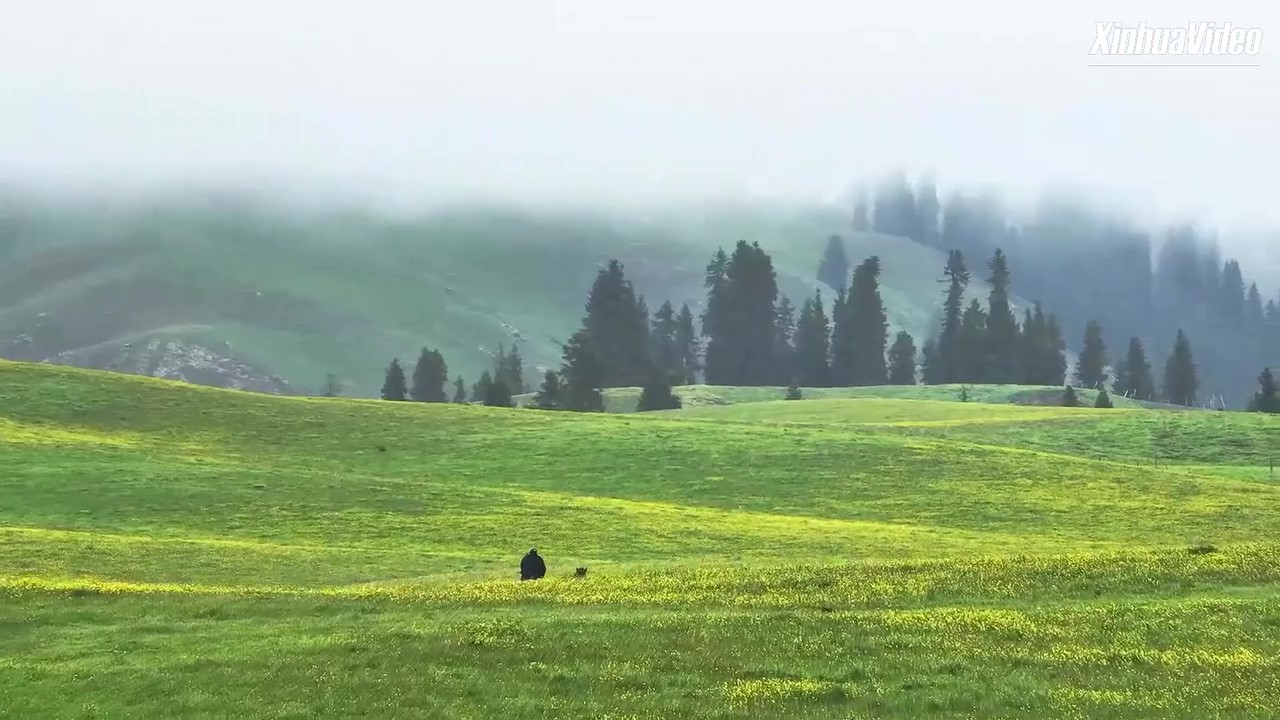
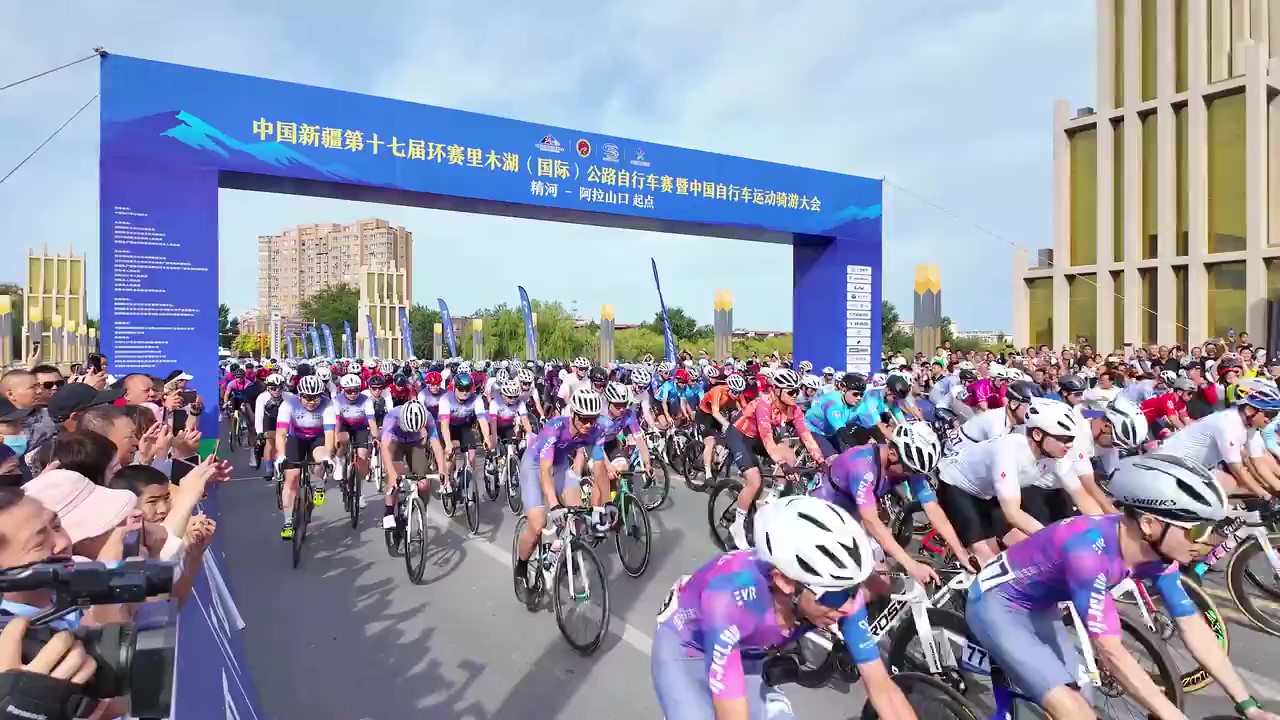

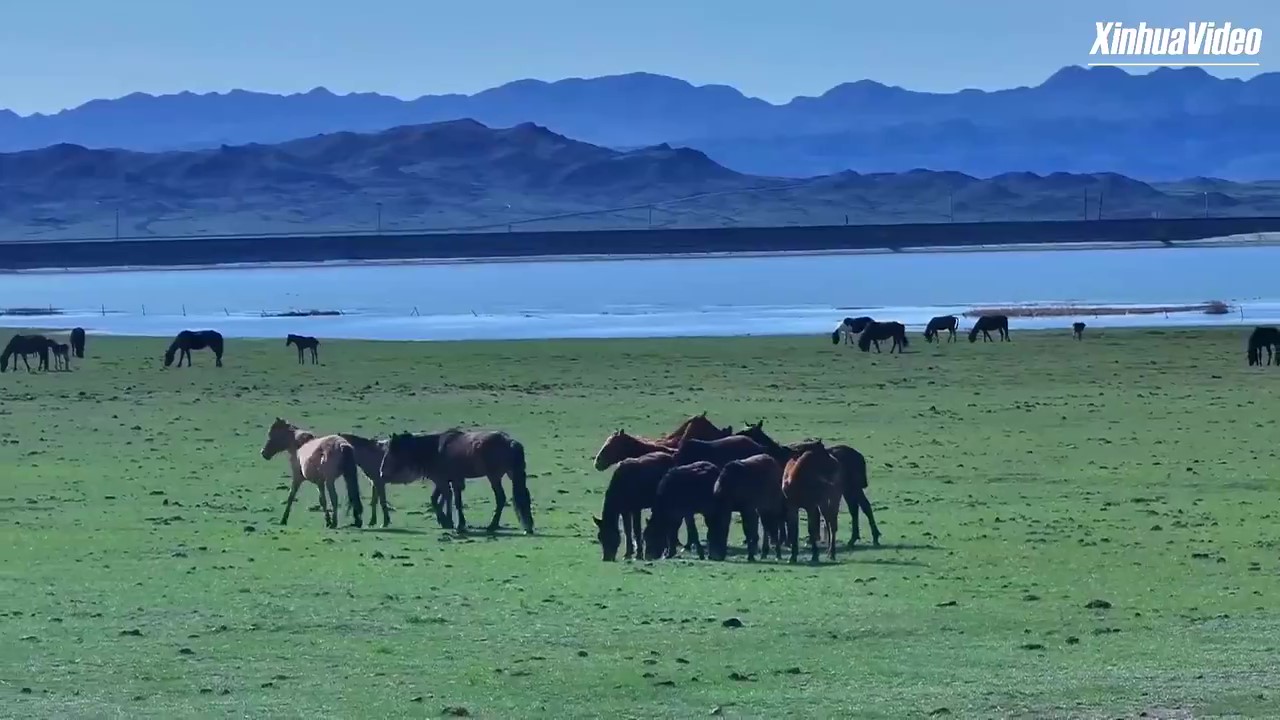
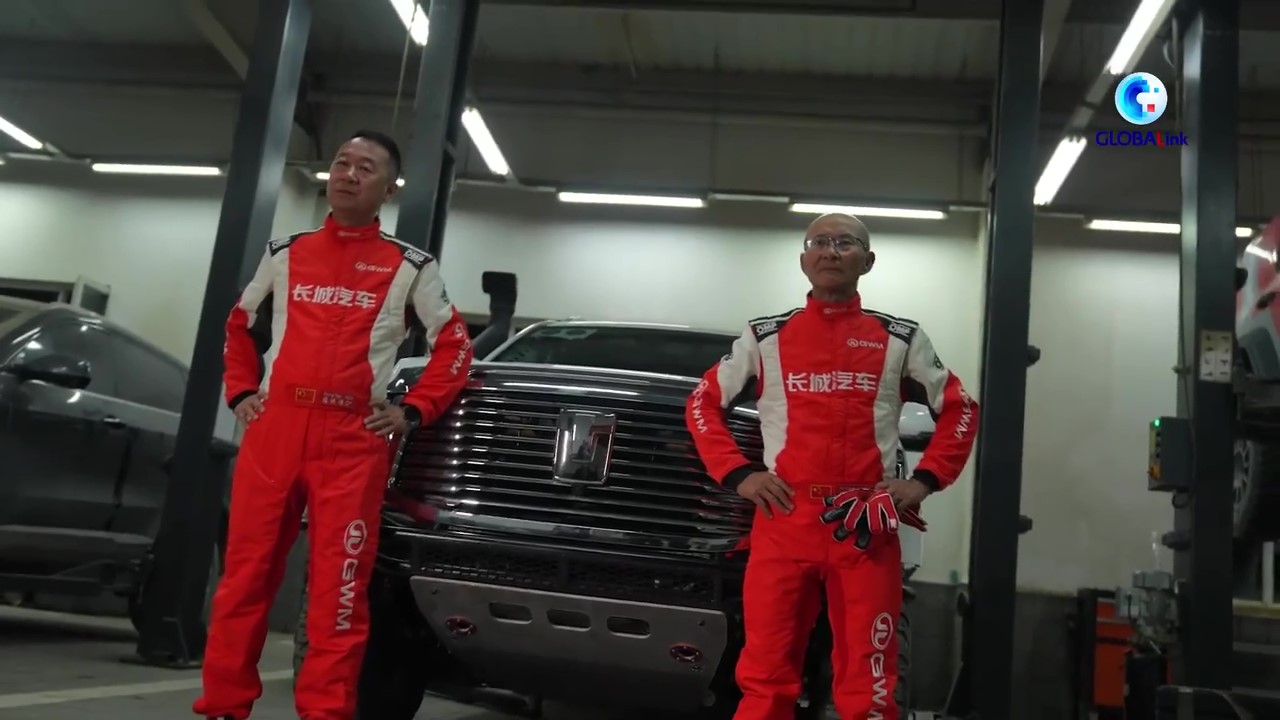
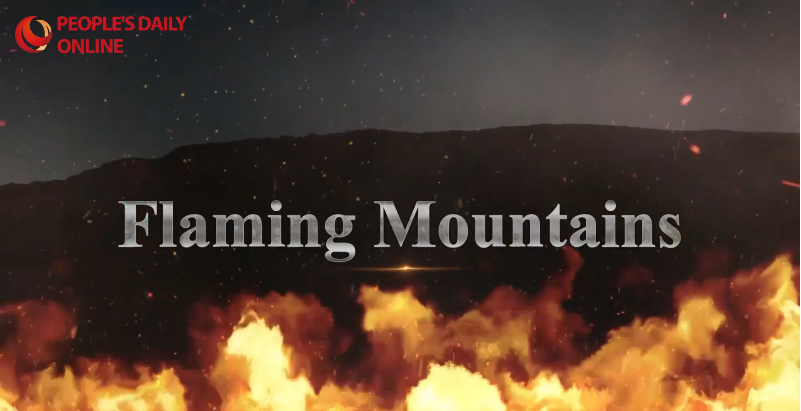
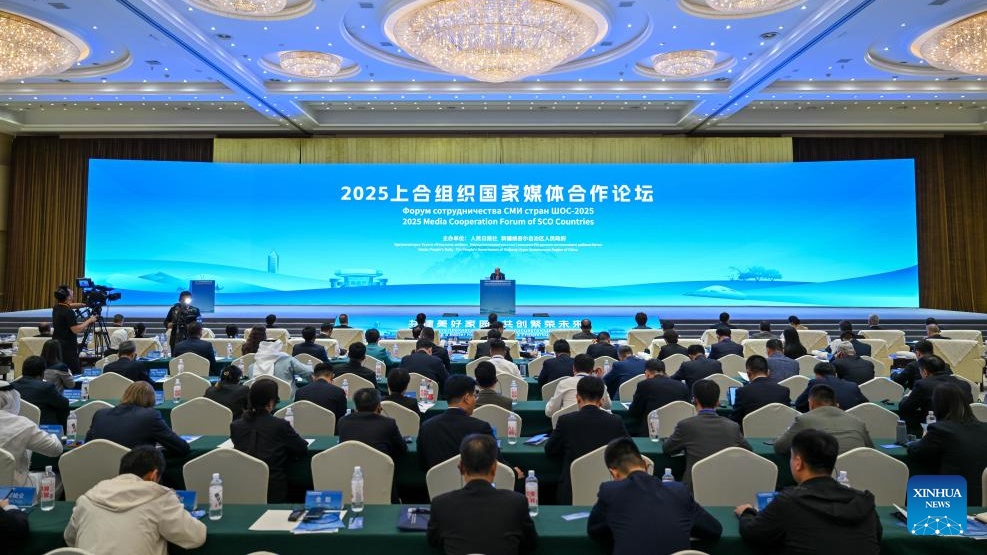
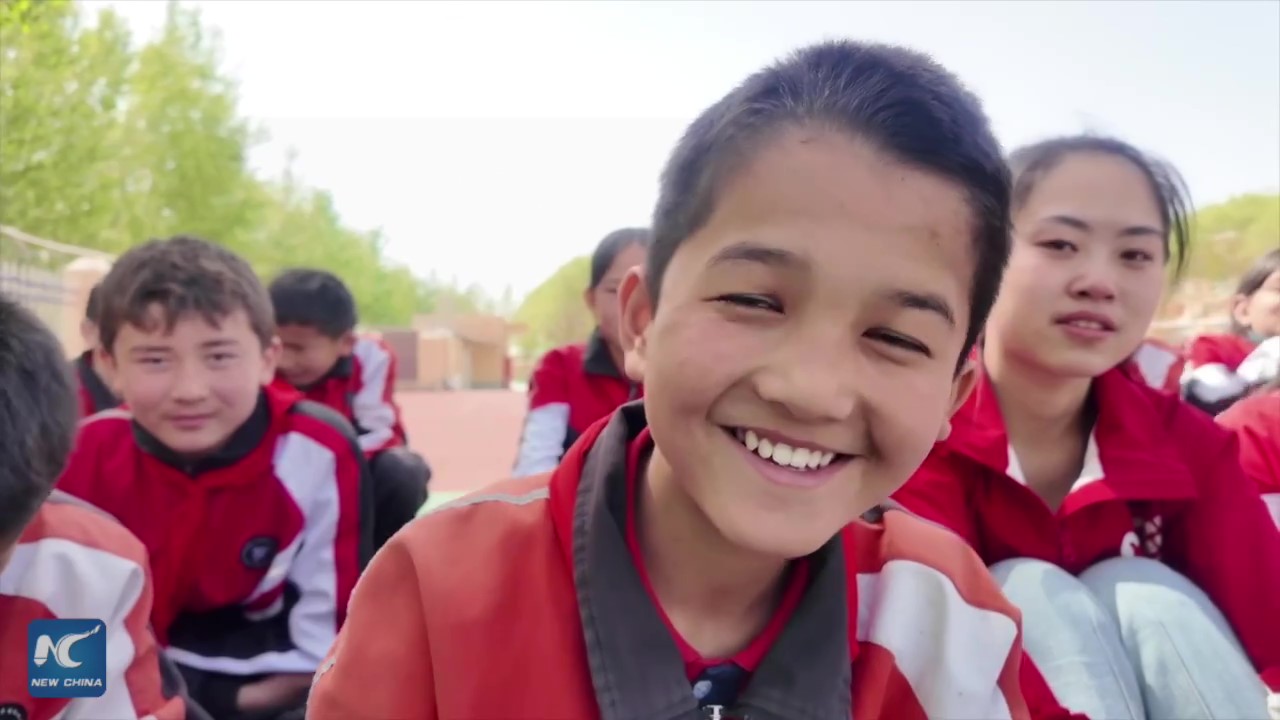
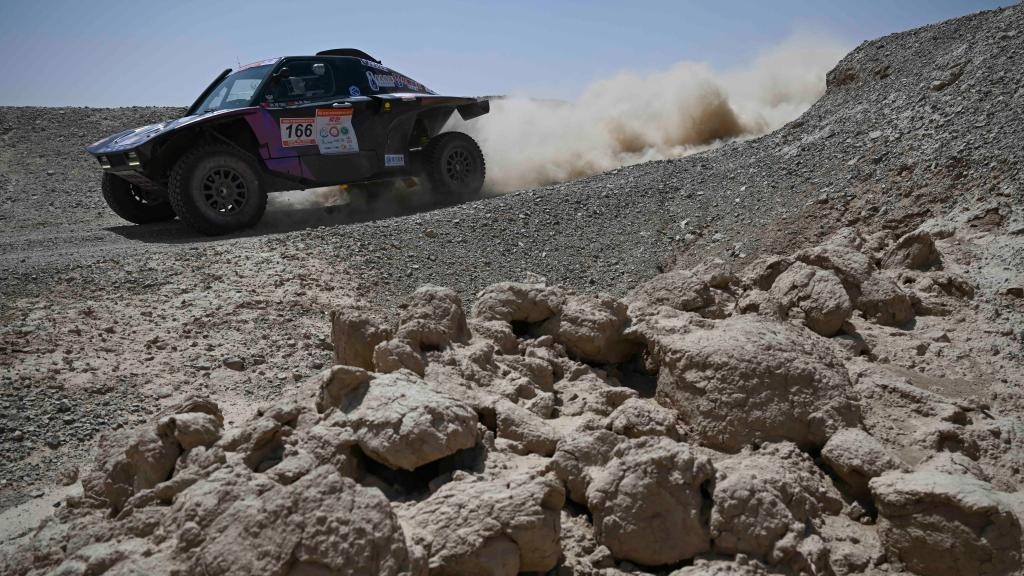

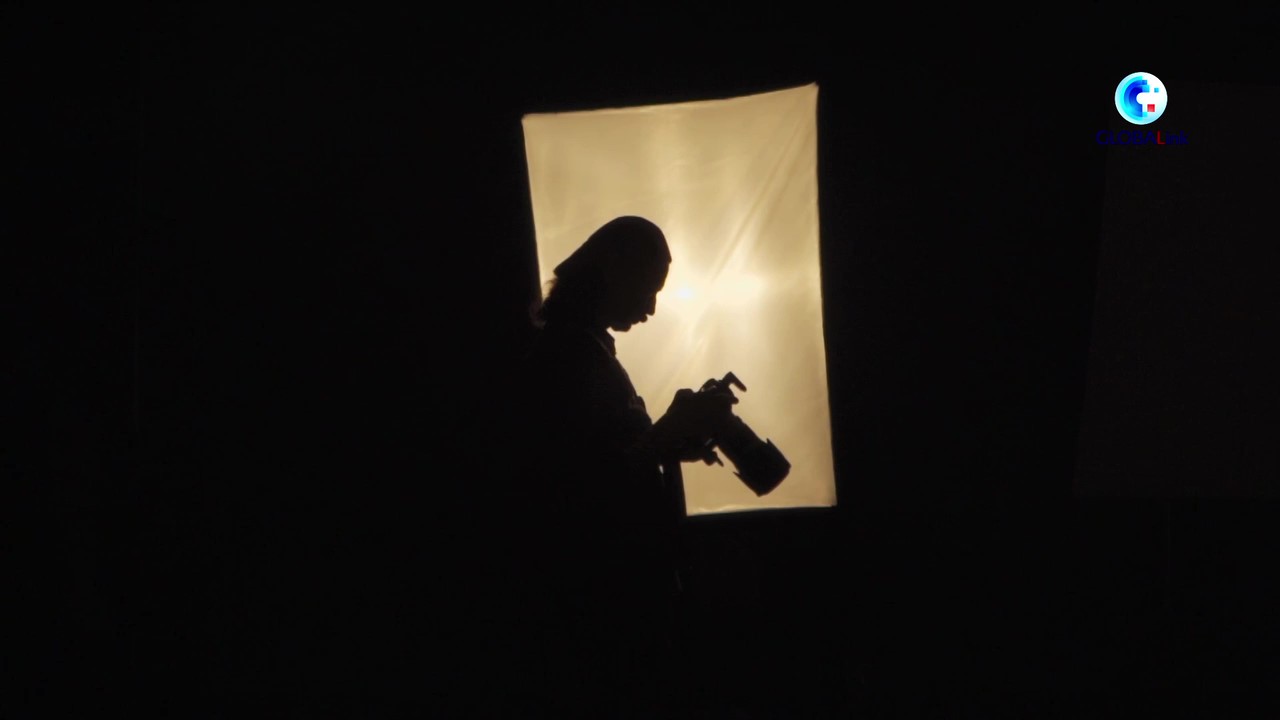
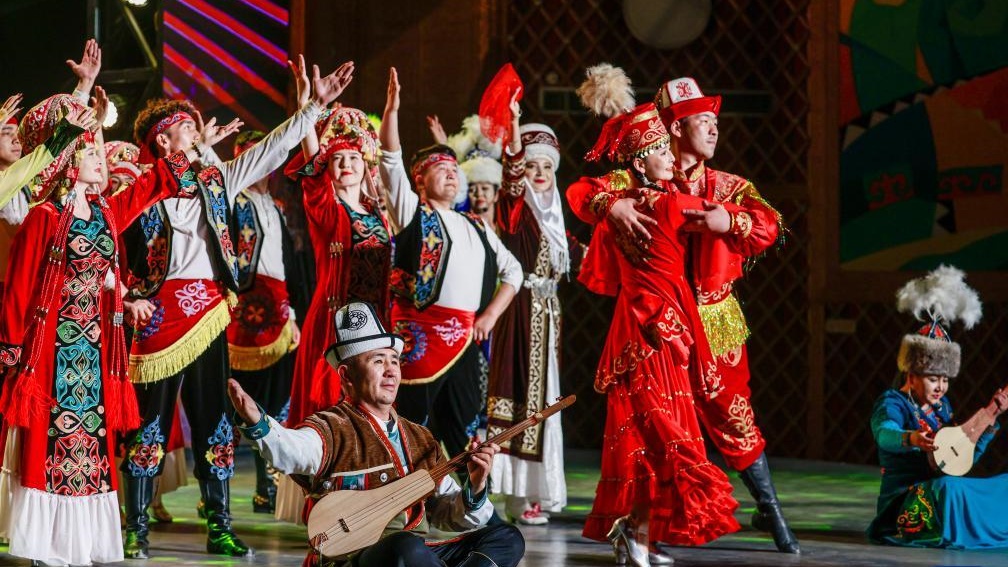
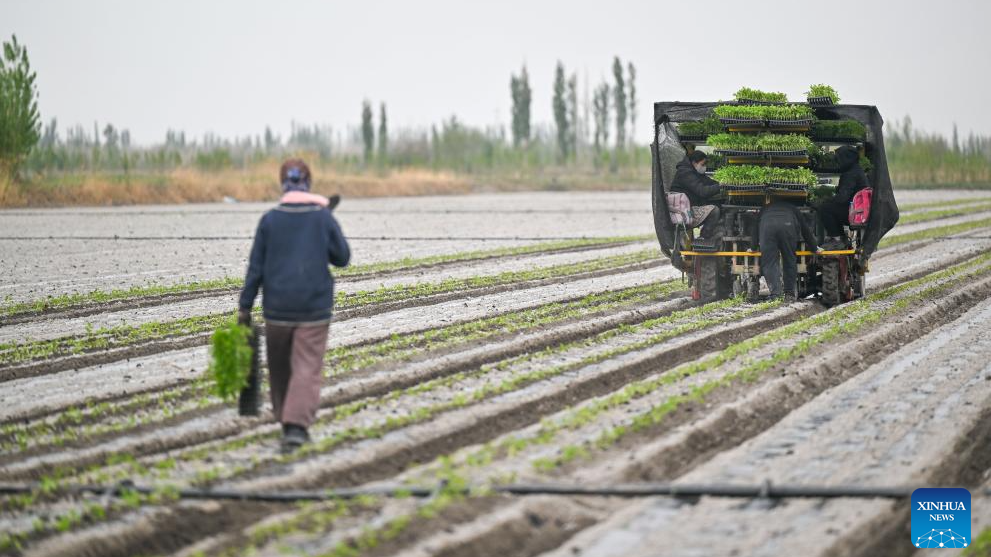


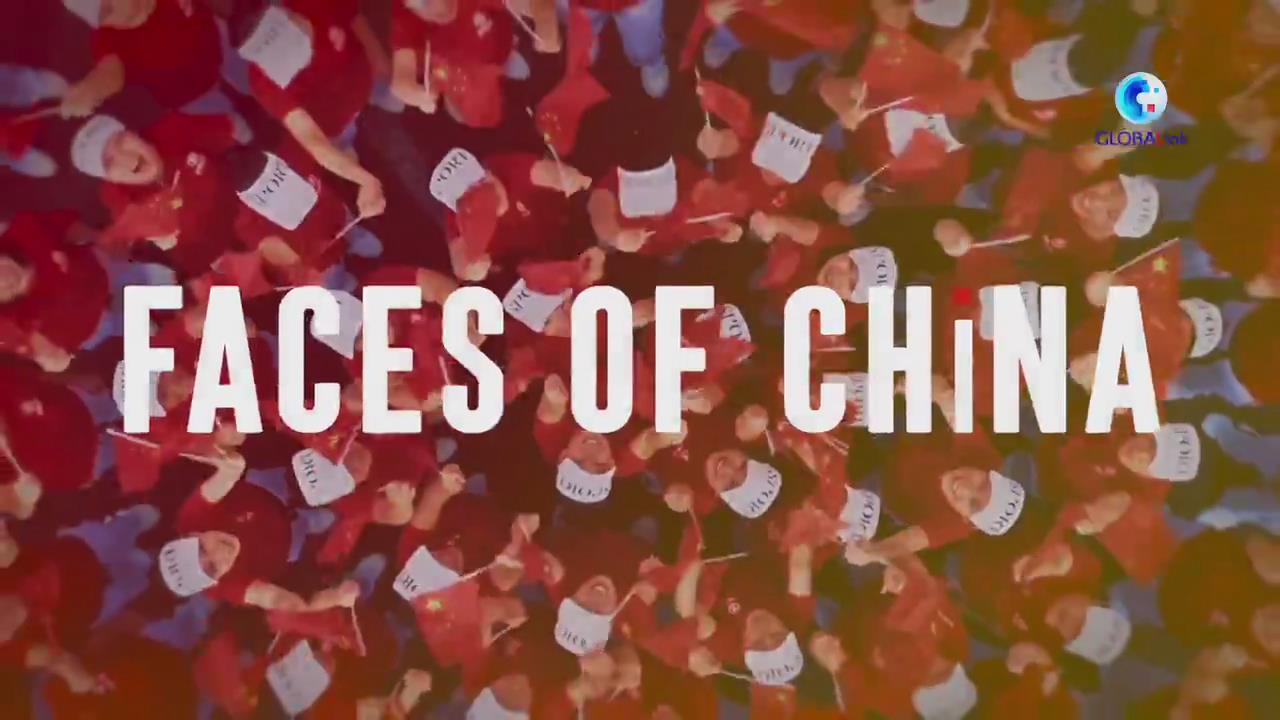
.png)
